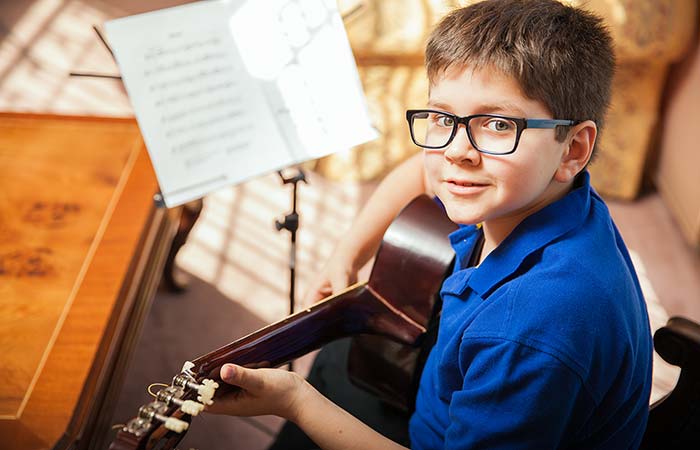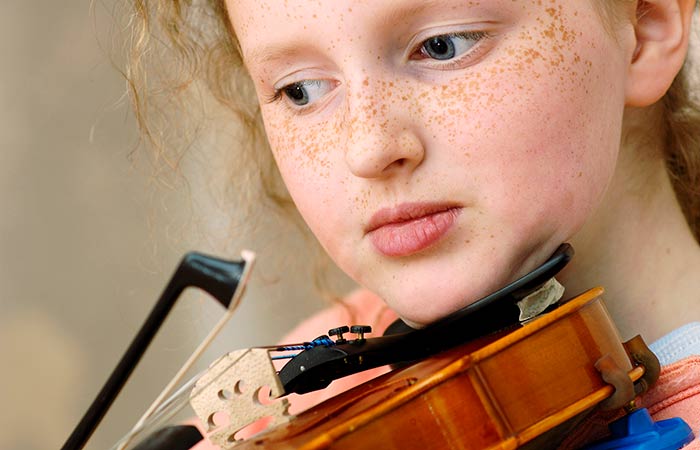Music has a magical ability to brighten our days, spark creativity, and even aid in learning.
For children, incorporating music into their daily routine can have profound benefits, from boosting mood to enhancing cognitive skills.
Here are some creative ways to make music a natural part of your child’s everyday life.

1. Wake up with music
Mornings set the tone for the entire day, and what better way to start than with music?
Replace the usual alarm clock with an upbeat song or create a personalised morning playlist to energise and motivate your child.
Sing a cheerful tune together while brushing teeth or getting dressed.
For younger children, you can make up silly songs about what the day holds—it’s a simple yet effective way to make mornings brighter and more engaging.

2. Use music as a learning tool
Music is a fantastic way to enhance learning.
Studies show that children retain information better when it’s set to a melody.
Incorporate songs into study sessions to help with memorisation, whether it’s multiplication tables, spelling words, or historical dates.
Nursery rhymes are a classic example of how rhythm aids memory, but older children can benefit too.
Consider creating custom jingles or finding educational songs online to reinforce what they’re learning in school.
Music also helps with language development.
Listening to songs in different languages can improve vocabulary and pronunciation while exposing children to new cultures.

3. Turn chores into a musical event
Chores don’t have to be boring.
Turn tidying up, doing the dishes, or folding laundry into a fun activity by adding music.
Play your child’s favourite songs and encourage them to dance or sing along as they work.
Younger children may enjoy songs with instructions, like “clean up, clean up” tunes, while older kids might prefer energising pop or rock tracks.
This approach not only makes chores enjoyable but also instils a positive attitude towards responsibilities.

4. Introduce musical instruments
Introducing your child to a musical instrument is one of the most rewarding ways to incorporate music into their routine.
Learning an instrument develops discipline, patience, and creativity. Start with simple, child-friendly instruments like a keyboard, ukulele, or percussion set.
If they show a strong interest, consider enrolling them in formal lessons to help them progress.
Even casual play can spark a lifelong love for music. Set aside time each day for your child to experiment with sounds and create their own melodies. This fosters self-expression and encourages exploration.

5. Incorporate music into playtime
Music naturally enhances playtime by making it more immersive and exciting.
Whether your child enjoys building with blocks, drawing, or imaginative play, having music in the background can inspire creativity.
Try playing soundtracks that match their activities—for example, classical music during arts and crafts or adventurous tunes for role-playing games.
For active play, create a playlist of action songs that encourage movement, like “Head, Shoulders, Knees, and Toes”. These types of songs combine music and physical activity, benefiting both the mind and body.

6. Create a musical bedtime ritual
Evenings are a time to wind down, and music can play a soothing role in your child’s bedtime routine.
Introduce calming lullabies, classical pieces, or gentle instrumental tracks during storytime or as they settle into bed. Singing a favourite bedtime song together can also become a cherished nightly ritual.
For older children, consider introducing mindfulness music or nature sounds to help them relax and prepare for sleep.
A consistent bedtime playlist can signal that it’s time to rest, creating a comforting sense of routine.

7. Celebrate milestones with music
Music is a wonderful way to celebrate your child’s achievements, big or small.
Whether they’ve aced a test, completed their chores, or simply had a great day, play their favourite song and have a mini dance party together.
This not only boosts their confidence but also makes them feel recognised and valued.
For birthdays or special occasions, create a family tradition of singing a unique celebratory song.
These little moments build lasting memories and deepen emotional connections.

8. Explore music outdoors
Take music beyond the home by incorporating it into outdoor activities.
Sing songs during walks or car rides, or bring along a portable speaker for a musical picnic in the park.
Engaging with music in natural settings can enhance the experience and make outings more memorable.
For a fun twist, encourage your child to mimic the sounds of nature using their voice or an instrument, blending music and the environment.

9. Try music-themed apps and games
Modern technology offers countless apps and games that make learning music interactive and enjoyable.
From rhythm-based challenges to virtual instruments, these tools can be a fantastic way to incorporate music into your child’s daily routine.
They’re especially helpful for busy parents, as children can engage independently while still gaining valuable skills.
Some apps teach basic music theory, while others let children compose their own songs.
Many are gamified, making the learning process feel like play.

10. Host family jam sessions
Family jam sessions are a fantastic way to bond and nurture your child’s love for music.
You don’t need to be musically trained—just grab some household items to use as makeshift instruments and have fun creating rhythms together.
Singing, clapping, and drumming can turn any evening into a lively and joyful experience.
These sessions can also serve as an opportunity to introduce your child to different genres of music, broadening their musical horizons.

The benefits of music in daily life
Incorporating music into your child’s daily routine has numerous benefits.
It helps improve concentration, enhances emotional well-being, and fosters a sense of discipline and creativity.
Additionally, music strengthens family bonds, as shared experiences become treasured memories.
The key is to make music a natural and enjoyable part of everyday life.
Whether it’s through singing, playing instruments, or simply listening, every interaction with music contributes to your child’s growth and happiness.

Conclusion
Bringing music into your child’s daily routine is like giving them a lifelong treasure chest of joy and creativity.
From cheerful morning tunes to soothing bedtime lullabies, music has the magic to turn the everyday into something extraordinary.
These playful ideas make it easy to weave music into their day, sparking happiness, learning, and special moments.
So, grab an instrument, crank up the tunes, and let the rhythm of life take over—because every day is better with a little music!












